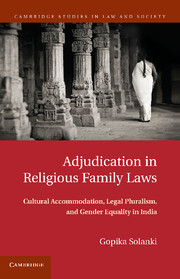 Adjudication in Religious Family Laws
Adjudication in Religious Family Laws Published online by Cambridge University Press: 03 May 2011
This book poses the following questions: How do accommodative arrangements advocating cogovernance by state and society in legally plural societies impact on the interactions between and within religious groups and other societal bodies? How do they shape gender equality in the family? What is the nature of state-society interactions in the adjudication of religious laws in legally plural societies? The study aims to describe, understand, and, in the end, explain the functioning of the Indian policy of legal pluralism as an accommodative measure in the governance of marriage and divorce among Hindus and Muslims. The Indian state has adopted what I call a shared adjudication model in which the state and a broad range of societal bodies share adjudicative authority. In other words, the Indian state, in the governance of religious family law, adopts the strategy of “regulated autonomy” by which it incorporates religious groups into the governance of the family and circumscribes their sphere of autonomy. This strategy is an outcome of the Indian state's desire to shape the family and gender from above while balancing the plural demands of groups. The model has been crafted from above but it been creatively interpreted, shaped, and used by societal actors and bodies, its boundaries challenged, changed, and stretched on the ground.
Given that the Indian state recognizes state and nonstate laws and allows adjudication in formal and informal arenas, how do we distinguish between state and societal laws and characterize interactions between official and unofficial legal arenas?
To save this book to your Kindle, first ensure [email protected] is added to your Approved Personal Document E-mail List under your Personal Document Settings on the Manage Your Content and Devices page of your Amazon account. Then enter the ‘name’ part of your Kindle email address below. Find out more about saving to your Kindle.
Note you can select to save to either the @free.kindle.com or @kindle.com variations. ‘@free.kindle.com’ emails are free but can only be saved to your device when it is connected to wi-fi. ‘@kindle.com’ emails can be delivered even when you are not connected to wi-fi, but note that service fees apply.
Find out more about the Kindle Personal Document Service.
To save content items to your account, please confirm that you agree to abide by our usage policies. If this is the first time you use this feature, you will be asked to authorise Cambridge Core to connect with your account. Find out more about saving content to Dropbox.
To save content items to your account, please confirm that you agree to abide by our usage policies. If this is the first time you use this feature, you will be asked to authorise Cambridge Core to connect with your account. Find out more about saving content to Google Drive.